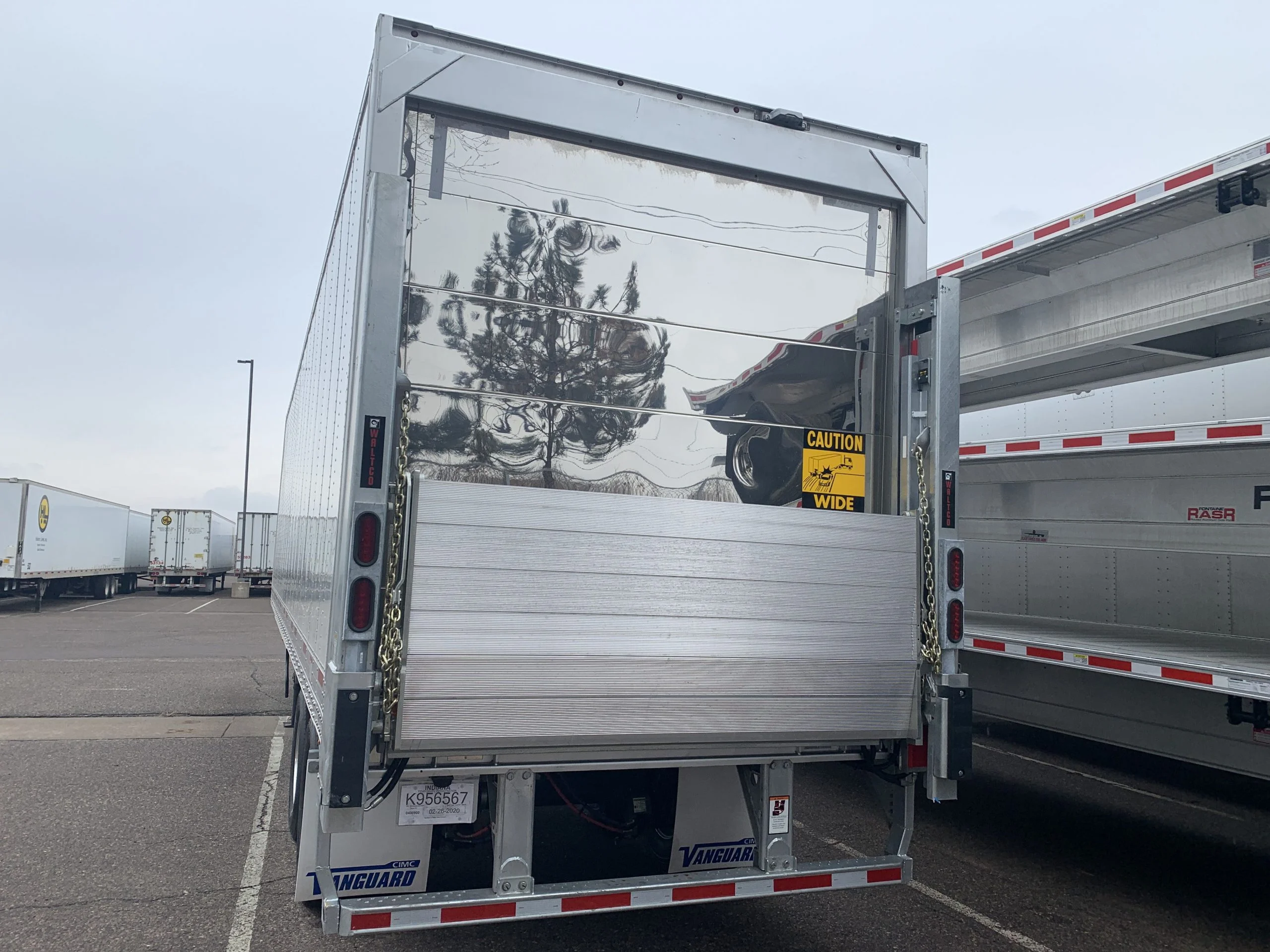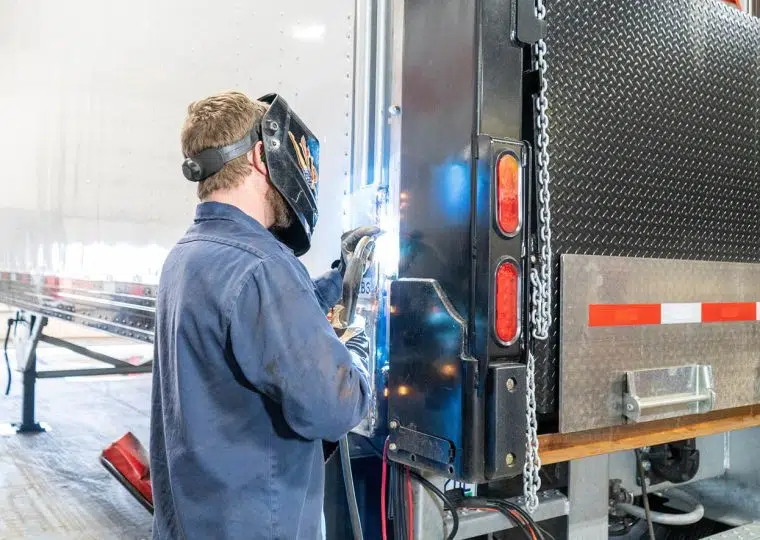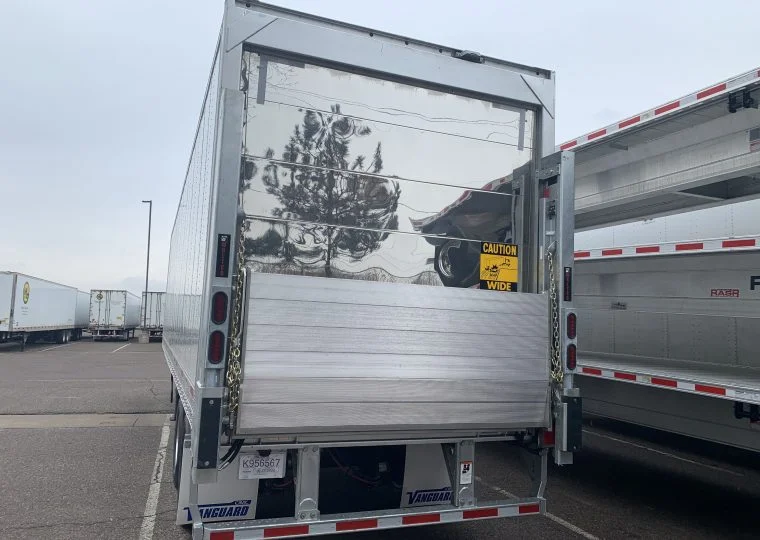For many truckers, liftgates are critical components in the loading, unloading, and delivery of their cargo. Liftgates save incredible amounts of time and manpower, and make many aspects of the job safer for the operator. They are especially crucial for semi-trucks which handle a significant amount of cargo daily.
However, like any other mechanical equipment, liftgates are prone to various issues that could hamper their functionality and, by extension, the operation of your transportation business. This post will take a look at liftgates in general, and then dig into the most common issues and their fixes. We’ll talk more about why they fail, the general importance of routine maintenance and inspections, and how to make sure your liftgate operates smoothly for years to come.
 Trailer Liftgate Overview
Trailer Liftgate Overview
A trailer liftgate is a hydraulic or electric platform installed at the rear of a trailer or truck to facilitate the loading and unloading of goods. There are different types of liftgates, each designed to meet specific needs. The most popular types of liftgates include:
- Cantilever Liftgates: Known for their high lifting capacity, these are ideal for heavy loads and offer a stable platform.
- Column Liftgates: These operate using a pair of vertical columns and are known for their high lift capacity.
- Tuckaway Liftgates: These are stored beneath the trailer when not in use, making them a space-saving option.
- Rail Liftgates: These are mounted on the rear of the vehicle and slide up and down along vertical rails, providing a sturdy and reliable lifting solution.
The operation of nearly all liftgates requires a blend of both electrical and hydraulic systems. The hydraulic system does the heavy lifting, but it’s powered by an electric motor. Key components include the motor, hydraulic pump, cylinders, and electrical controls. By having a clear understanding of how liftgates work, as well as their important components and systems, understanding the issues that occur and the solutions to these issues will be much easier.
Common Liftgate Issues
Failures with your liftgate can, and undoubtedly will, happen at the least expected and most inconvenient times. They will cause delays and can create safety hazards as well. Here is a list of common liftgate failures that you may see:
- Hydraulic Failures: These could occur due to leaks in the hydraulic system, worn seals, or damaged cylinders, affecting the liftgate’s ability to raise or lower the platform effectively.
- Electrical Issues: Electrical problems such as faulty wiring, malfunctioning switches, or dead batteries can prevent the liftgate from operating.
- Structural Damage: Over time, the liftgate’s platform or frame might suffer from structural damage due to overloading or accidents, which can reduce its functionality and safety.
- Unusual Noises: Squeaking, grinding, or banging noises during operation can indicate problems with the liftgate’s mechanical or structural components.
- Misalignment: The liftgate platform may become misaligned, making it difficult to load or unload goods smoothly.
Fixing Common Liftgate Issues
Depending on what liftgate system has been affected by the failure, the solutions can be relatively simple, or complex and highly involved. In many cases DIY fixes may be a viable option. For more advanced issues or troubleshooting, however, experts in liftgate repair should be consulted.
Hydraulic leaks can be fixed by replacing the damaged hoses or seals. Hydraulic fluid levels should be checked and replenished as necessary. For electrical issues, damaged wiring can be replaced to restore electrical connections. Malfunctioning switches can be replaced, and dead batteries should be charged or replaced as needed.
Damaged or bent components may need to be straightened or replaced. Depending on the severity of the issues, welding might be required to fix cracks or broken welds. Additionally, adjusting the alignment can help the liftgate operate smoother, and replacing worn or damaged rollers or slides can help with alignment issues.
Common Reasons Why Liftgates Fail
Sometimes, identifying the root cause of liftgate failure can help find a solution. This can be particularly valuable in cases where a similar failure has occurred multiple times. Here are some of the common reasons for liftgate failure:
- Lack of Maintenance: Neglecting regular maintenance can lead to the deterioration of essential components, eventually resulting in liftgate failures.
- Overloading: Exceeding the liftgate’s weight capacity can cause structural damage and put excessive strain on the hydraulic system.
- Wear & Tear: Like any mechanical system, liftgates are subject to wear and tear over time, which can lead to various issues if not addressed promptly.
- Environmental Factors: Extreme weather conditions can affect the performance and longevity of your liftgate, especially its electrical and hydraulic systems.
- Improper Use: Misusing the liftgate or operating it incorrectly can lead to damages and malfunctions.
 Regular Liftgate Maintenance & Inspections
Regular Liftgate Maintenance & Inspections
Regular maintenance and inspections are crucial in preventing liftgate issues and ensuring your semi-truck stays up and running. Conducting routine checks is an important step in maintaining your liftgate’s performance. This involves visual inspections to spot any visible damages, loose bolts, or hydraulic leaks.
Scheduling professional inspections is another crucial aspect of liftgate maintenance. Professionals can individually inspect every component to ensure they are in good working order and identify potential issues that may not be apparent to the untrained eye. A well-maintained liftgate also requires regular lubrication of moving parts to reduce wear and ensure smooth operation. Checking the hydraulic fluid levels and topping off as necessary is vital for the hydraulic system’s performance.
Lastly, keeping the liftgate clean is essential to prevent the buildup of grime and debris, which can hamper its operation. Special attention should be given to the electrical and hydraulic components to ensure they remain free from dirt and corrosion. Through diligent maintenance and inspections, you can significantly extend your liftgate’s lifespan, ensuring it remains reliable and ready to handle your loading and unloading needs efficiently.
Let North American Trailer Handle Your Liftgate Issues
Don’t let liftgate issues bring your operations to a halt. With a better understanding of the most common liftgate problems, what causes them, and how to fix them, you’ll be in a better position to keep your operations running as intended. Regular maintenance, timely repairs, and professional inspections are key. Contact North American Trailer today to schedule expert liftgate repair and maintenance services at one of our locations in Minnesota, Wisconsin or North Dakota.


 Trailer Liftgate Overview
Trailer Liftgate Overview Regular Liftgate Maintenance & Inspections
Regular Liftgate Maintenance & Inspections